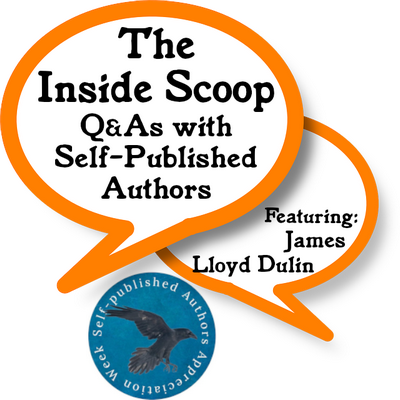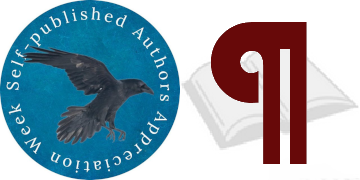
Dulin’s another who 1. Came my way thanks to JCM Berne and 2. Gave some specifics that really underscore what kind of commitment self-publishing takes. As I go through these Q&As one final time before publishing, my appreciation for what they do grows. Hope you find that to be the case yourselves.
Before we get into things, why don’t you give the reader a brief introduction to you and your work.
My name is James Lloyd Dulin, and my debut novel, No Heart for a Thief, came out on January 24, 2023. No Heart for a Thief is a dark, coming of age adult fantasy centered around two characters as they navigate a world of war and colonization. When the spirits place the fate of a young war orphan in Kaylo’s hands, he has to face the past he left behind and the war he abandoned to keep them both alive.
No Heart for a Thief is the first in a trilogy of books with the second, No Safe Haven to release fall 2023. This series will be great for fantasy fans who are interested in character driven plots, mentor relationships, unique magic systems, and non-European inspired settings..
You can find more about me, the first chapter of No Heart for a Thief, and signed copies on my website, https://www.jamesldulin.com/.
Books for sale: https://books2read.com/u/bxrzJD
Twitter and TikTok @jamesldulin
What kind of costs are associated with self-publishing a book? Do you hire one or more editors, or one editor for a couple of passes? Cover artist? Anyone to help with layout, design, etc.? Beta readers? Or do you take it all on yourself? Are you actually making any money at this, or are you still focused on breaking-even while building an audience?
There are so many ways to answer this question. It all depends on the author, their budget, and their needs.
For editing, authors may spend money on beta readers, sensitivity readers, developmental editors, copy editors, and proofreaders. However, there are also ways to cut expenses and find people interested in helping out at no cost.
With No Heart for a Thief, I hired a couple of beta readers because it was easier to have them work on my time table, and they only charged $40 each. I also hired a sensitivity reader because I am writing about characters with identities that I do not share, which cost $400. I skipped a developmental editor because I had done so much work with a writing group, self-edits, and critique partners. Then my copy editor and proofreaders cost me $1,000 and $450 respectively.
When these prices are based on word count, it can get expensive in a genre like fantasy.
My next biggest expense was hiring my cover artist, Felix Ortiz. Felix is an expert and well-known in the self-published indie community, so his work came at a premium of $1,500. However, my brother is an expert at typography, so I was able to save money on cover design.
There are several other expenses here and there that pop up, but editing and cover art were the bulk of my pre-release costs.
To answer the question, I am working on earning my costs back and building an audience. Hopefully, I’ll make some money in the long run, but right now, more is going out than coming in as I prepare for books two and three of my trilogy.
Word-count costs like that would make me think about changing genres—or at least trying to switch to novellas 🙂
How did you get together with Felix Ortiz? Tell me about how cover design part of the process went. (it’s becoming a theme in these interviews, and it’s making me curious)
You aren’t wrong. Costs based on word count make me rethink my genre.
As for artwork, I emailed Felix through his ArtStation account with my idea for the cover, he got back to me fairly quickly. We emailed back and forth about the idea, then he went to work getting it ready for my launch timeline. Something about my original idea wasn’t working 100%. Felix was depicting it as described, but unfortunately what I asked for didn’t fit the vibe of the scene we were setting. We ended up finding our way through with a bit of trial and error, coming to a beautiful cover in my humble opinion. I credit Felix with a lot of the initial attention I received for my novel.
Self-publishing tends to have less external deadlines keeping one accountable. How do you maintain your work process or work ethic?
This is an interesting sentiment. Although, self-published authors do not have the same external pressures as traditionally published authors, there is a lot of pressure created by the culture around self-publishing.
One of the biggest strengths that self-publishing offers an author is that we can publish at a fraction of the speed of traditional publishers. As such, readers have come to expect a quicker output from the authors they follow. If an author isn’t releasing at least a book a year, they risk losing relevancy. Often, authors have to release multiple books a year to keep their momentum.
At the end of the day, no one is going to call us up demanding the new manuscript. However, if we have ambitions of growing a readership, we better produce.
Luckily, at least at this point, I really enjoy being a self-pub author and putting out my work. I’m in this to tell as many stories as I can. So, I’m glad there isn’t a machine holding back my time table.
If you were to start the process over with the experience you have now, what would you do differently?
If I had done more work to become a part of the indie fantasy community sooner, I would have had less stress struggling to figure out how to self-publish. I had a cover artist who tried to scam me and a copy editor who bailed on me, both of which set my process behind by months. However, once I connected with authors and talked to them about their connections, I was able to find a great team to help me publish my book.
The biggest lie about self-publishing is the name “self-publishing.” In order to do this right, you need a team to help you produce the book, but you also need a community to support you. There are so many things I don’t understand about publishing yet, so many techniques and marketing strategies that I haven’t thought of. If I had to do it on my own, my book would be lying in obscurity—or more obscurity.
Seriously, finding my place in the indie author community has helped me figure things out while maintaining my mental and emotional health through the process.
This second paragraph is gold—and am sure that it’ll generate a few “amen”s.
How do you decide a book is finally finished and ready? (or how do you avoid “perfection as the enemy of good”?)
I have only made this decision once so far, but I’m getting close to making it again. No Heart for a Thief was ready for me when I decided that I would be proud for people to read the book with my name on it. When I stopped needing other people to tell me it was good and I knew that it was, my book became ready to release.
There is always going to be something to improve, especially since I am always going to be improving. If I finish my tenth novel, and I have not grown as an author, I have not been an author worth reading. The story is not the only important part of a book. The craft, the way we tell the story, is just as important. If I’m not honing that, I have failed as an author.
That is a long way of saying, that I have to be comfortable knowing that I will grow beyond they first book I published. However, I have to know that when I published it, I was proud of the work I had done. If I can say that, it was the right decision.
Thanks for your time and participation! Hope you enjoyed it! And do know that there are many of us out here who appreciate and applaud what you do (and our number is growing)!
Be sure to check out No Heart for a Thief!

Clker-Free-Vector-Images from Pixabay
The 2023 Self-Published Authors Appreciation Week Logo was made by Witty and Sarcastic Book Club



Read Irresponsibly, but please Comment Responsibly